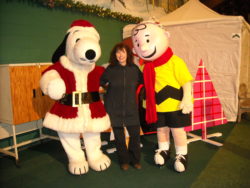 The Best of The Grammar Diva
The Best of The Grammar Diva
In the spirit of the holiday season, I thought you might like to know where some of the common holiday words come from. Here are the etymologies (origins) of some common holiday words:
Christmas (noun or adjective) – From the late Old English Cristes maesse, Christ and mass. Christmas was written as one word beginning in the mid 1300s. Christmas cards were first designed in 1843 and became popular by the 1860s.
Hanukkah (noun) – also spelled Chanukah and Hanukah (and other less common ways), it is from the Hebrew meaning to dedicate or consecrate.
Advent (noun) – Means important arrival, first used in 1742 to indicate an extended “season before Christmas” (Old English), from the Latin advent (a coming, approach, arrival).
Carol (noun) – Used from around 1300, carol means “a joyful song”and also to “dance in a ring” from the Old French carole. It is perhaps also related to the Latin choraula, meaning a dance to the flute. Before that, from the Greek Khoraules, the flute player who accompanies the choral dance. Khoraules is from khoros (chorus) and aulein (to play the flute).
Dreidel (noun) – The four-sided top bearing the Hebrew letters nun, gimel, he, and shin, one on each side, is from the Yiddish dreydl. In Middle High German, drey means “to rotate or turn.”
Grinch (noun) – Meaning “spoilsport,” all uses of this word trace to Dr. Seuss’s 1957 book How the Grinch Stole Christmas.
Latke (noun) – The pancakes, traditionally eaten on Chanukah and generally made from potatoes, have their origins from the East Slavic latka, a dialectical from of aladka, which is a kind of pancake. It goes further back to the Old Russian oladiya, a derivative of the Greek word for oil. If you have ever eaten latkes, you will understand the reference to oil!
Mistletoe (noun) – From the Old English mistiltan, from mistel and tan (“twig)” Also from the Old Norse mistilteinn, Norwegian misteltein, and Danish mistelten. Venerated by the Druids, the custom of hanging it at Christmas and kissing under it is mentioned by Washington Irving.
Noel (noun) – From the late 14th century nowel (feast of Christmas), from Old French noel (the Christmas season), a variant of nael, from Latin natalis (birth). As a masculine proper name, from Old French, probably literally “of or born on Christmas.”
Scrooge (noun) – Generic for miser, 1940, from the character in the Dickens 1843 story A Christmas Carol. It does not appear to be a genuine English surname.
Wassail – Mid 12th century Old Norse ves heill (be healthy) a salutation, from ves, (to be) and heill (healthy). Use as a drinking phrase appears to have arisen among Danes in England and spread to native inhabitants. A similar formation appears in Old English (wes þu hal), but this is not recorded as a drinking salutation. The meaning extended in the 13th century to “liquor in which healths were drunk,” especially spiced ale used in Christmas Eve celebrations. Used to mean “a carousal, reveling” first around the 16th century.Wassailing as the “custom of going caroling house to house at Christmas time” is recorded from 1742.
Yule (noun or adjective ) – From Old English geol, geola (Christmas Day, Christmastide) from Old Norse jul (a heathen feast), later taken over by Christianity, of unknown origin. The Old English cognate giuli was the Anglo-Saxons’ name for a two-month midwinter season corresponding to Roman December and January, a time of important feasts but not itself a festival. After conversion to Christianity, it narrowed to mean “the 12-day feast of the Nativity” (which began Dec. 25), but was replaced by Christmas by the 11th century, except in the northeast (areas of Danish settlement), where it remained the usual word. It was revived in the 19th century by writers to mean “the Christmas of ‘Merrie England.’ The first direct reference to the Yule log is in the 17th century. Old Norse jol seems to have been borrowed from Old French asjolif, hence Modern French joli, meaning “pretty, nice,” and originally “festive.”
- So whether you go wassailing, carrying Yuletide carols to all the neighbors, or you have been called Scrooge or Grinch, enjoy your holiday season—-and eat lots of latkes!
-
Remember: Books make great gifts!
Happy Holidays from The Grammar Diva!



very illuminating
That makes me happy! 🙂